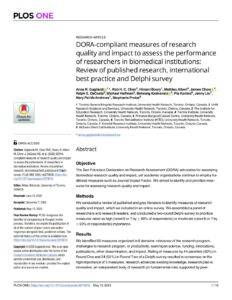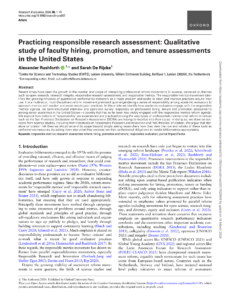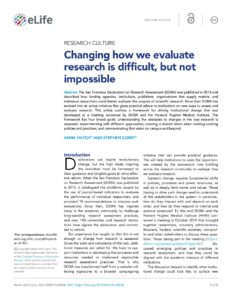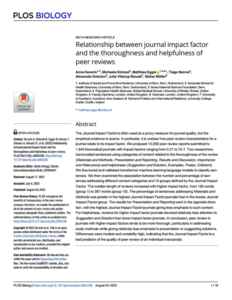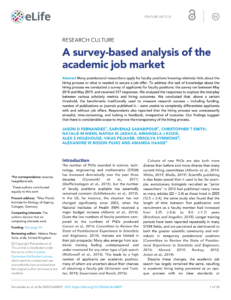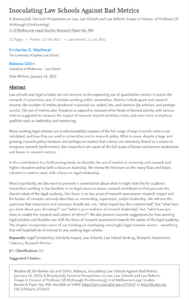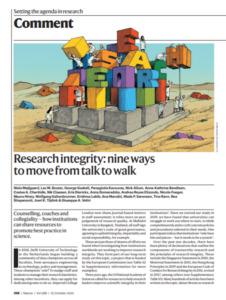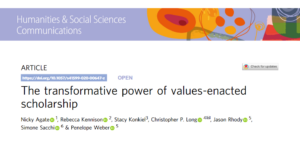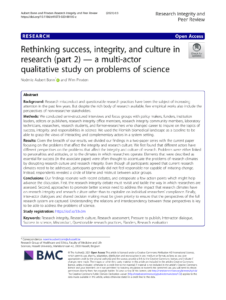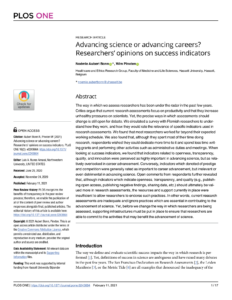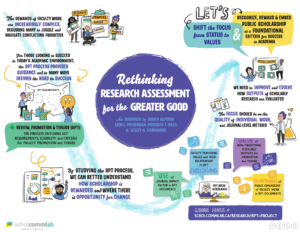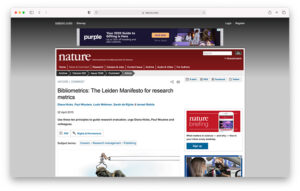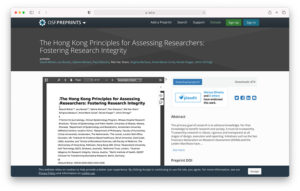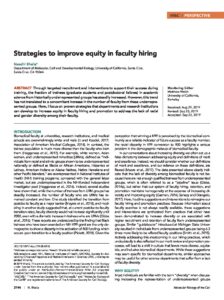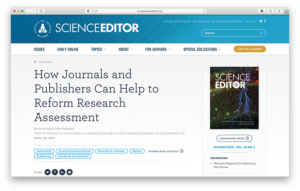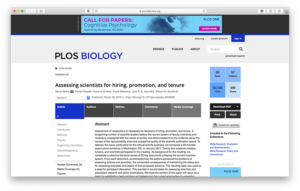A collection of materials to facilitate the development of responsible research and researcher assessment policies and practices.
Search and Filter
Resource type
Intended audience
Good practicesJournal articles
For: Journals and publishersResearch institutes
2023
This paper reviewed existing literature and international best practices and established consensus by Delphi survey on 10 key measures for assessing research quality and impact that align with DORA values. These measures were chosen from a pool of 50 compiled measures that emphasize diverse and holistic evaluations of research performance beyond traditional metrics like journal…
Good practicesJournal articles
For: Research institutes
2024
This paper examines how to appropriately recognize and reward quality research. It critiques the overreliance on traditional quantitative indicators like journal impact factor and citation counts in evaluating scientific achievements. These metrics often fail to capture the true value and impact of research and can lead to undesirable behaviors that hinder scientific progress. The authors…
Good practicesJournal articles
For: Journals and publishersResearch institutes
2024
This paper explores the relationship between open access (OA) publishing and citation diversity, offering insights into how accessibility shapes scholarly communication. Regarding responsible research assessment, open scholarship is largely important, helping to evaluate work on its own merits when it is openly accessible. The authors determined that freely available scholarly publications attract citations from a…
Good practicesJournal articles
DORA-produced
For: Research institutes
2024
This paper investigates the processes and criteria involved in faculty hiring, promotion, and tenure assessments within academic institutions in the United States. Considering the relative size of the United States and its worldwide standing in academic research, there has been less public commitment to reforming research assessment from American research institutions than in similarly positioned…
Journal articles
DORA-produced
For: FundersResearch institutes
2020
Based on discussions at a meeting DORA co-sponsored with the Howard Hughes Medical Institute in October 2019, DORA developed a framework for driving institutional change.
Journal articles
For: Research institutes
2023
Pre-publication peer review organized by journals is often mentioned as an important aspect of journal “quality.” Thus, if Journal Impact Factor was a measure of journal quality, there should be a relationship between the quality of peer reviews performed under a journal and the Impact Factor of that journal. This study of 10,000 reviews found…
Journal articles
For: Research institutes
2020
Understanding the hiring dynamics of the academic job market is an important step for institutions wishing to enhance the transparency of their hiring process and attract talent. To establish the profile and perceptions of academic job seekers, the authors collected survey data from 317 early-career researchers who were in the process of applying for academic…
Journal articles
For: Research institutes
2021
In their working paper, authors Kimberlee Gai Weatherall and Rebecca Giblin review the use of metrics in university and research policy with a focus on Australia. The metrics reviewed include grant income, journal bibliometrics and citations by authors and courts. This review aims to create awareness among legal scholars “of the full range of ways…
Journal articles
For: FundersResearch institutes
2020
Niels Mejlgaard and co-authors conducted a comprehensive study of research integrity in Europe, called “Standard Operating Procedures for Research Integrity (SOPs4RI).” Their work identified nine topics and accompanying action items to improve research integrity within three broad areas: Support Research environment Supervision and mentoring, Integrity training Ethics structures Organization Integrity breaches Data practices and management…
Journal articles
For: Research institutes
2020
In this article, Nicky Agate and co-authors use the work of the HuMetricsHSS Initiative to argue that the current system of research assessment relies on too limited a set of metrics to appropriately reward the full breadth of scholarly work performed by researchers. To address this inconsistency, the authors propose a values-enacted approach (e.g., aligning…
Journal articles
For: FundersProfessional societiesResearch institutes
2020
The authors, Noémie Aubert Bonn and Wim Pinxten, conducted interviews and focus groups with a variety of Flemish biomedical stakeholders in order to survey and define success, integrity, and responsibilities in science. The stakeholders interviewed included policy makers, funders, institutional leaders, research integrity officers, editors, publishers, and researchers. In this paper, which is the second…
Journal articles
For: FundersProfessional societiesResearch institutes
2020
The authors, Noémie Aubert Bonn and Wim Pinxten, conducted interviews and focus groups with a variety of Flemish biomedical stakeholders in order to survey and define success, integrity, and responsibilities in science. The stakeholders interviewed included policy makers, funders, institutional leaders, research integrity officers, editors, publishers, and researchers. In this paper, which is the first…
Journal articles
For: FundersProfessional societiesResearch institutes
2020
A survey was conducted by Noémie Aubert Bonn and Wim Pinxten to understand how Flemish researchers work and how they would rate the relevance of specific research assessment indicators in career advancement and advancing science. Survey results suggested that current indicators used to assess career advancement (e.g., indicators of prestige like high journal impact factor…
InitiativesJournal articles
For: Journals and publishersResearch institutes
2021
In this piece, Alicia Kowaltowski, Ariel Silber, and Marcus Oliveira outline challenges faced by the scientific research community resulting from the current framework of academic assessment. Challenges outlined by the authors include: Increased pressure on researchers to produce knowledge Increased pressure on researchers to publish and increased frequency of retraction of scientific articles due to…
Journal articles
For: Research institutes
2020
To improve research assessment practices in academic institutions, it is critical to understand the institutional metrics used to assess research quality for promotion. This article examines traditional and non-traditional criteria used to assess biomedical scientists for promotion and tenure in 92 randomly selected international institutions. The study found that the evaluation of scientists emphasizes traditional…
Advocacy resourcesJournal articles
For: Research institutes
2020
The ScholCommLab in Canada conducted a multi-year project examining more than 850 review, promotion, and tenure (RPT) guidelines in the United States and Canada to better understand academic career advancement. The lab examined how the public dimensions of faculty work, use of the Journal Impact Factor, and non-traditional scholarly outputs were recognized and rewarded in…
InitiativesJournal articlesPolicies and guidance
For: FundersResearch institutes
2015
The Leiden Manifesto provides ten principles for the appropriate use of metrics in research evaluation.
InitiativesJournal articlesPolicies and guidance
For: FundersResearch institutes
2019
Institutions and funders can use the Hong Kong Principles to reward and recognize scholars for behavior that contributes to trustworthy research.
Journal articles
For: Research institutes
2019
Despite the increasing number of underrepresented minorities in trainee positions, the number of underrepresented faculty members in academic science remains low.
Journal articles
DORA-produced
For: Journals and publishers
2019
Editorial decisions influence research assessment. This article provides 10 concrete recommendations that journals and publishers can take to help improve how research is assessed.
Journal articles
For: Research institutes
2018
Six principles for hiring, promotion, and tenure were developed at a one-day workshop in Washington DC in January 2017 to address incentives and rewards in research assessment.

